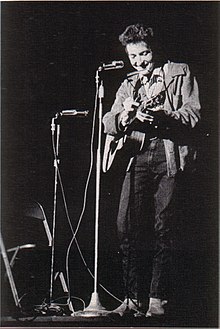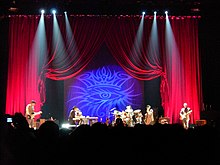I'm Not There
Appearance

I'm Not There is a 2007 biographical film inspired by the life of musician Bob Dylan.
- Directed by Todd Haynes. Written by Todd Haynes and Oren Moverman.
All I can do is be me. Whoever that is. taglines
Jude Quinn
[edit]- [To a crucifix] How does it feel?
- [Looking up at a giant Jesus on the cross] Do your early stuff!
- How can I answer that if you got the nerve to ask me?
- See, you just want me to say what you want me to say.
- Yeah, I have none of those feelings.
- God, I'm glad I'm not me.
- Yeah, it's chaos, it's clocks, it's watermelons, it's everything.
- Everybody knows I'm not a folk singer.
- I don't need to look to someone else to tell me I'm good. Slaughter me for all I care; I refuse to be hurt.
- Good and evil were invented by people trapped in scenes!
Arthur Rimbaud
[edit]
- I accept chaos. I don't know whether it accepts me.
- You know, it's nature's will. And I'm against nature. I don't dig nature at all.
- Seven simple rules for life in hiding:
1. Never trust a cop in a raincoat. 2. Beware of enthusiasm and of love, each is temporary and quick to sway. 3. If asked if you care about the world's problems, look deep into the eyes of he who asks; he will not ask you again. 4. and 5. Never give your real name and if ever told to look at yourself, never look. 6. Never say or do anything the person standing in front of you cannot understand, and 7. Never create anything. It will be misinterpreted, it will chain you and follow you for the rest of your life and it will never change.
- Woody Guthrie was dead, Little Richard was becoming a preacher, so whether you're a folksinger or a Christian, rock 'n' roll was the devil. Me? I was in a ditch, up a cliff, out of step, ready to quit. I wrote the kind of stuff you write when you have no place to live and you're wrapped up in the fire pump. I nearly killed myself with pity and despair. And then I wrote it. It was like swimming in lava. Skipping, kicking, catching a nail with your foot. Seeing your victim hanging from a tree.
- You don't have to write anything down to be a poet. Some work in gas stations. Some shine shoes. I don't really call myself one because I don't like the word. Me? I'm a trapeze artist. Sighting it and hearing it and breathing it in; rubbing it all in the pores of my skin. And the wind between my eyes, milk and honey in my comb.
- I know I have a sickness festering somewhere. I don't mean like Woody Guthrie, wasting away in some hospital. I couldn't do that, decay like that. That's nature's will, and I'm against nature. I don't dig nature at all. The only truly natural things are dreams, which nature cannot touch with decay.
Jack Rollins
[edit]- All they want from me is finger-pointin' songs. I only got ten fingers.
- It's a fierce sort of feeling, thinking something is expected of you but you don't know exactly what it is. Brings forth a weird kind of guilt.
Robbie Clark
[edit]- New York, August 7 of 1964. Congress grants President Johnson complete authority over the war while she studies painting at Cooper Union and he completes dubbing on his first major film. She tells him she's sure it will be a hit. And the cats across the roof, mad in love, scream into drainpipes. And it's I who am ready, ready to listen. Never tired, never sad, never guilty.
- Grain of Sand would become the underground hit of 1965 and Robbie Clark the new James Dean, Marlon Brando, and Jack Kerouac all rolled into one. But the movie disappointed her. The more they tried to make it youthful, the more the energies on screen seemed out of date. It wasn't the film they had dreamed, the film they had imagined and discussed. The film they each wanted to live.
Billy the Kid
[edit]- People are always talking about freedom. Freedom to live a certain way, without being kicked around. 'Course, the more you live a certain way, the less it feel like freedom. Me, I can change during the course of a day. I wake and I'm one person, when I go to sleep I know for certain I'm somebody else. I don't know who I am most of the time.
- It's like you got yesterday, today and tomorrow, all in the same room. There's no telling what can happen.
Dialogue
[edit]- Reporter: Jude! One word for your fans?
- Jude: Ocelot.
- Jude: Whoa, look at all these medicines! Hey man, what are those?
- Man at Party: Mandy's, make you sleep.
- Jude: Sleep? I don't need sleep. Sleep is for dreamers.
- Hobo: Coulda sworn you was an older man.
- Woody: Well, I used to be. Much older.
- President Nixon: I have asked for this radio and television time tonight for the purpose of announcing that we today have concluded an agreement to end the war and bring peace with honor in Vietnam and in southeast Asia. The following statement is being issued at this moment in Washington and Hanoi: At 12:30 Paris time today, January 23, 1973 … [trails off]
- Robbie: That's when she knew it was over for good. The longest running war in television history. The war that hung like a shadow over the same nine years as her marriage. So why was it suddenly so hard to breathe?
- Claire: I would like to know what is at the center of your world.
- Robbie: Center of my world? Wow, you're not monkeyin' around.
- Claire: Why? It's very simple, this question.
- Robbie: Hm, well, I'm 22. I guess I would say me.
- Claire: I suppose you are honest.
- Robbie: Don't you think that you're the center or that you should be the center? Thinking with your own head, talking with your own mouth?
- Claire: Yes, but there are things in the world, too, that are important.
- Jude: Feeling deeply, that's what this is about? What precisely, please do tell, am I supposed to be feeling, huh?
- Keenan Jones: I'm simply referring to standard emotions – pain, remorse, love.
- Jude: Yeah, I have none of those feelings.
- Jude: Doesn't really matter, you know, what kind of nasty names people invent for the music. But, uh, folk music is just a word, you know, that I can't use anymore. What I'm talking about is traditional music, right, which is to say it's mathematical music, it's based on hexagons. But all these songs about, you know, roses growing out of people's brains and lovers who are really geese and swans are turning into angels – I mean, you know, they're not going to die. They're not folk music songs. They're political songs. They're already dead. You'd think that these traditional music people would – would gather that mystery, you know, is a traditional fact, you know, seeing as they're all so full of mystery.
- Keenan Jones: And contradictions.
- Jude: Yeah, contradictions.
- Keenan Jones: And chaos.
- Jude: Yes, it's chaos, clocks, and watermelons – you know, it's – it's everything. These people actually think I have some kind of, uh, fantastic imagination. It gets very, uh … lonesome. But traditional music is just, uh … it's too unreal to die. It doesn't need to be protected. You know, I mean, in that music is the only true valid death you can feel today, you know, off a record player. But like everything else in great demand, people try to own it. Has to do with, like, uh, the purity thing. I think its meaninglessness is holy. Everybody knows I'm not a folk singer.
Cast
[edit]- Cate Blanchett – Jude Quinn
- Ben Whishaw – Arthur Rimbaud
- Christian Bale – Jack Rollins/Pastor Jack
- Richard Gere – Billy the Kid
- Marcus Carl Franklin – Woody Guthrie
- Heath Ledger – Robbie Clark

